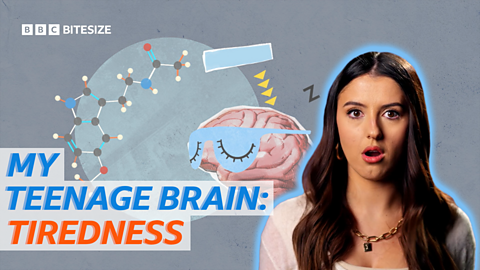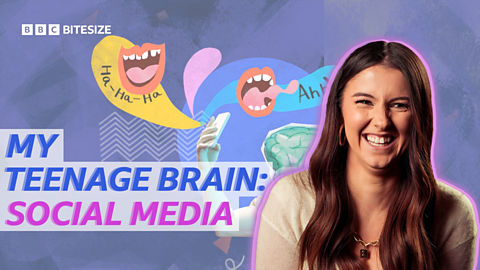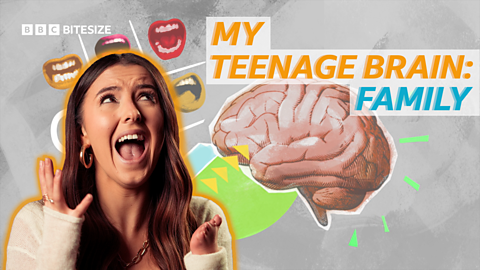Teens Jasmine and Aggy chat with Tara about the strong emotions they’ve felt in their teens.
Jasmine: Sometimes, usually ended with a little bit of an argument.
Jasmine: I don't know if you are the same, but your emotions are very up and down. You know, sometimes I'd be in such a good mood, have loads of high energy and then other times I'd just fall into a rut.
Aggy: I feel that, I feel that.
Jasmine: You just feel like nothing can motivate you and I just want to lie in bed but you know you have stuff to do. If I was at home and going through my little to-do list, and my mum asks me, "Can you unload the dishwasher?" I would get so annoyed because I felt like it disrupted my little plan that I had.
Aggy: Would you still do it?
Jasmine: Sometimes, usually it ended with a little bit of an argument. She would be like, just do it, it will only take ten or fifteen minutes. Afterwards, I'd always feel so guilty because it would only take me ten or fifteen minutes but at the time it would just irritate me so much.
Tara: This trio of negative emotions is anger, sadness and worry. Sometimes when we get those feelings they feel like they are out of proportion to the trigger and that seems to happen more in the teenage years because we know the brain continues to develop until your early twenties so teenage brains tend to be more emotionally reactive and teenagers sometimes can find it harder to think things through and to process things. Their emotions react quicker and stronger.
Jasmine: If something happened, I wouldn't ever really tend to feel sad about it. My first reaction would probably be to call a friend to rant to her about it.
Tara: What are some of the top tips for you?
Aggy: Just find an outlet for the emotions, especially the negative emotions that you are feeling. A good thing that I did was boxing. I took my negative emotions away and left it there. When you are taking it out on the bags or sparring, for example, it's really good. Or football, or whatever sport you like. And also just finding a way to have more control over your mind like meditation, for example.
Jasmine: Probably one of the biggest things is getting out of your own head. One for me is putting on feel-good music and just dancing around my room. Doing something physical to take your mind off it. Not necessarily to distract, but just to put space and distance between you and your thoughts and then the actions coming in between.
Tara: What you are talking about is being able to stand back and have a look at your own feelings and think of them from a different context. And sometimes changing your physical setting, like going outside or dancing can give you that little bit of space between you and your thoughts. You know, your thoughts getting stuck and being in a rut.
Jasmine: Just in a loop. You need to break it up.
As a teenager, you may find that your emotional reactions to situations feel more intense than they did previously. Do you know why?
Your emotions may feel bigger or more intense because your amygdala, which controls your fight/flight response, can be more reactive during your teenage years, meaning your actions are guided more by how you’re feeling than by the rational part of your brain.
All of this is a natural part of development, but it can feel pretty uncomfortable at times and some people might find it more challenging than others. Here are some videos exploring teenage emotions and some words of advice on how to deal with them from psychologists Dr Tara Porter and Dr Glenn Mason.
How the teenage brain deals with emotions
We spoke to Tara in more depth about emotions during the teenage years and how you can manage them. She explained that there are several reasons why emotions can feel bigger during the teenage years:
The teenage brain is more sensitive to stimuli.
More stress hormones like cortisol tend to be released during the teenage years.
The pre-frontal cortex – which is the part of the brain responsible for more rational, logical thinking – is still developing.
Jasmine and Aggy talk in the video about how they take part in physical activities like boxing or dancing to help with these feelings. Tara explains that this can be helpful because, “You’re using up the energy that's generated by difficult emotions in a constructive way.”
Working through emotions in this way can be helpful, but there are also things you can do to activate your parasymthetic nervous system, which is the body’s calming response. For this, Tara says, you can, “take some deep breaths, relax, let your shoulders go, and let go of the wave of emotion.” This can help you to move through the anger, anxiety, sadness or other difficult emotions.
Impulsive behaviour
Jasmine and Aggy share their experiences of impulsive behaviours with Tara.
Aggy: I was wearing a heavy shoe.
Jasmine: Got his big boots on, big stomping boots on.
Jasmine: When you are feeling strong emotions, you don't know how to process them or you don't know how to deal with them, you'll do something that's a little bit impulsive that might make you feel better. For example this time last year, I had red hair. Not because I really wanted red hair, I just wasn't feeling great and I thought this'll make me feel better. It didn't. But impulsive actions like that you know, is to me, is like you not being able to process or fully understand your emotions.
Tara: Or sit with your emotions.
Aggy: One hundred percent. Worst and most impulsive thing I probably did, I kicked the door. I kicked the door and left a dent in it. I don't know why I did that.
Jasmine: At school? At home?
Aggy: At home, at home. The most impulsive thing I did at school…actually I'm not going to say that one. I'm not going to say that one.
Jasmine: What did your parents say about you kicking the door in? Was it your door? Your bedroom door?
Aggy: Yeah, my door, yeah I made a dent in it and yeah it wasn't good.
Tara: I bet it hurt your foot more than it hurt the door though.
Aggy: I was wearing a heavy shoe.
Jasmine: He's got his big boots on. His big stomping boots on.
Tara: What do you think about it now?
Aggy: Now, I look back at it and I'm just like, why? There was no need for that. There was no need for that.
Jasmine: I think a lot of people do that. They just think, why did I act like that? Like why, what was going through my brain that made me think, oh yeah, let's do this.
Tara: What was going through your brain was your brain was really lighting up, really sensitive to that kind of stuff. You know in asense you weren't…
Jasmine: Probably weren't aware of it.
Tara: …or in control of it.
Aggy: You are supposed to look back at yourself and laugh though because that is a sign of growth anyway.
Jasmine: Yeah I know, it is a sign of growth. Just sometimes I look back and I don't really understand my actions.
To manage feelings of impulsivity, Tara says it can be helpful to pause rather than immediately reacting to feelings when they arise. “Just having that pause,” she says, “where you think: Okay, I feel this really strongly, but feelings are just one source of data. There’s other stuff going on.” It can be helpful to move away from the situation, to go outside and look at the sky, to get a wider perspective to help you tune into the more rational parts of your brain."
“When you’re feeling angry, for example,” says Tara, “it can feel like you need to do something with that anger. You need to show people.” But emotions come in waves, and Tara says it can often help to just sit with your feelings for a while, knowing that they’ll eventually pass. You can think, “I really feel angry about that. But this will pass, this feeling of anger will pass.” Tara adds, “It won’t last forever.”
What's up with my emotions?
India Sasha explains why teenagers can experience intense emotions.
India: Do you ever get upset and then then later on realise maybe it wasn't that deep?
Everybody's different, but generally the human brain isn't finished developing until we're in our mid-20s. Particularly the rational, planning and thinking parts which are located in the the pre-frontal cortex of the brain. That means in our teenage years the emotional parts of our brain, like the amygdala, the limbic system, they're a bit too eager to react.
It's like we have an emotional mind where we feel things and react quickly and a rational mind which can be slower to kick in.
Like, the other day I was walking down the street in my own wee world, and my friend ran up behind me and obviously I jumped out of my skin! That was my emotional mind reacting quickly and telling me I was in danger. But then my rational mind kicked in and I realised I actually was safe and it was just my mate.
We make our best choices when our emotional and rational minds work together. Sometimes you can get stuck in that emotional mind and find it really hard to get past that instinctive reaction.
But remember the first reaction you have isn't always the only one to listen to. So when you feel yourself about to boil over, take a beat… and give your rational mind a chance to kick in. To find out more check out tips and advice below.
Our fight-or-flight instinct used to help us survive in the wild. It still gets triggered now, but often by much smaller things, like being put in an unexpected situation. “The activation of the amygdala,” Glenn explains, “throws your nervous system into a state of survival, activating your fight-or-flight response and knocking the rational part of the brain offline.” But there are things you can do to help yourself feel calmer when this is happening, and Glenn suggests using the CALM method.
How to stay CALM
C – Control your breathing
This can help to slow down your nervous system and activate calmness within the body.
A – Activity for the heart
Regularly doing activities that increase your heart rate and get you breathing in lots of oxygen can help boost brain health and improve your response to stressful and difficult situations.
L – Lights out!
Sleep is really important. If you’re not getting enough, your amygdala can go into overdrive. This makes it much more difficult for you to control your emotional responses.
M – Mindfulness
Meditation has many benefits. It reduces the activity within the amygdala, which can shift things from chaos to calmness.
Three important things to understand about your feelings and emotions
Tara explains that…
If your low moods or anxiety are lasting for long periods of time and not shifting, are out of proportion and are impacting on your daily life, that may be a sign to reach out for help.
While impulsive outbursts are natural during your teen years, it can become a worry if they’re happening regularly and impacting on your relationships.
You can talk to your parents or carers about going to see your GP, or talk to a school counsellor or another trusted adult.
If you need support
You should always tell someone about the things you’re worried about. You can tell a friend, parent, guardian, teacher or another trusted adult. If you're struggling with your mental health, going to your GP can be a good place to start to find help. Your GP can let you know what support is available to you, suggest different types of treatment and offer regular check-ups to see how you’re doing.
If you’re in need of in-the-moment support you can contact Childline, where you can speak to a counsellor. Their lines are open 24 hours a day, 7 days a week.
There are more links to helpful organisations on BBC Action Line.
You can find out more about the teenage brain here...
My Teenage Brain: Why am I so tired?
Feeling tired and you don't know why? Learn about why teenagers have a different sleeping pattern to others and get some advice on how to get better sleep.

My Teenage Brain: Why can't I stop scrolling?
For some top tips on breaking your scrolling habit!

My Teenage Brain: Why do I argue with my family?
Ever wondered why you might argue with your family more since becoming a teenager? You can learn more about family conflicts and gaining independence as a teen here!
